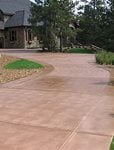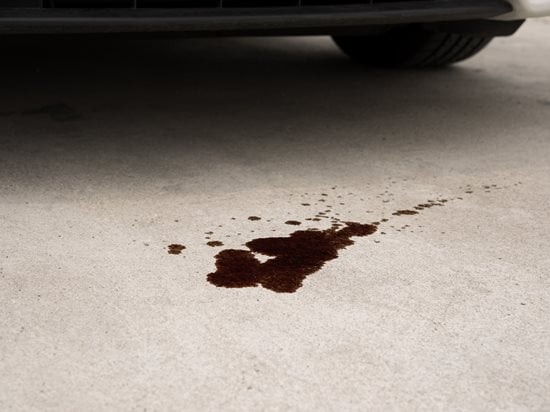- Concrete Cleaning Home
- Choosing a Concrete Cleaner or Degreaser
- How to Clean Exterior Concrete
- Concrete Cleaning Chemicals
- Pressure Washing Concrete
- Cleaning and Sealing Exterior Concrete: A Guide to Maintaining and Caring for Exterior Decorative Concrete of all Types
- Tips for Maintaining Exterior Concrete
- How to Clean Concrete
- How to Clean Concrete Floors
- How to Clean a Concrete Patio
- Cleaning a Concrete Driveway
- Cleaning Stamped Concrete
- Pool Deck Cleaning
- How to Clean Concrete Countertops
- How to Remove Stubborn Stains and Discoloration
- Advice on Cleaning Concrete Countertops, from Concrete-Countertops.org
- Related Information:
- Concrete Sealers
How to Remove Oil Stains from Concrete
Expert advice for getting stubborn oil stains out of a concrete driveway or garage floorDoes your concrete driveway or garage floor have unsightly oil stains? It’s important to remove oil before staining, sealing or resurfacing your concrete. If the oil isn’t removed it will eventually seep back through to the surface and ruin your new decorative treatment. Learn how to avoid this problem by removing the oil stains from your concrete.
Find concrete cleaning contractors near me.
Some oil stains are just small spills or spots, while other concrete surfaces are more heavily contaminated. The size of the oil stain, as well as its age, will determine how difficult it is to remove. Cleaning oil from concrete may take some trial and error to find the best method for your situation.
Here's how to deal with a fresh oil stain:
- Remove excess oil - Wipe up oil with a rag or use cat litter to absorb it.
- Scrub with a paste - Use baking soda or powdered laundry detergent and water to dissolve the oil stain. Rinse with water.
- Wash with soap - Dish soap and a scrub brush are often effective on new oil spots. Rinse the concrete clean.

Once you've tackled the oil stains you can add color or an overlay to make your driveway look amazing! Get ideas from these concrete driveway pictures.
These are the four best ways to remove old oil stains from concrete:
- Wash away the oil with a strong detergent, and a scrub brush or sponge
- Use a concrete cleaner or degreaser to loosen and remove the oil
- Apply a poultice that will break down the oil and suck it from the concrete
- Let special single-celled microorganisms eat up the oil
There are multiple chemical methods for removing oil or grease (both hydrocarbon-based materials) from concrete. Learn more about each of these approaches below.
 Cleaner & Degreaser
Easily clean grime, oils, and grease from concrete
Cleaner & Degreaser
Easily clean grime, oils, and grease from concrete
 Brickform Neutra Clean
A pH neutral cleaner that combines cleaning and light degreasing
Brickform Neutra Clean
A pH neutral cleaner that combines cleaning and light degreasing
 V-100 Cleaner/Degreaser
Alkaline detergent concentrate
V-100 Cleaner/Degreaser
Alkaline detergent concentrate
 Citrus-Solv
Naturally degrease, penetrate and liquefy heavy deposits
Citrus-Solv
Naturally degrease, penetrate and liquefy heavy deposits
Removing Oil With a Detergent
Small spills or spots can sometimes be removed with nothing more than a strong detergent, a scrub brush, and a sponge.
Using Concrete Cleaner or Degreaser
A more aggressive method is to use a commercial concrete cleaner or degreaser, like 700 DG Emerge from Franmar. Once scrubbed into the concrete surface, the soap acts like ball bearings, loosening up the oil to permit easier removal. The downside is that typical degreasers don't actually break down the oil, so they won't work well on concrete that is heavily contaminated or has been contaminated for a long time. Also, they are more effective on porous concrete as opposed to concrete with a hard or dense finish.
Cleaning Oil Stains With a Poultice
Another common treatment for removing oil stains from concrete is a poultice. Used primarily on small, stubborn stains, a poultice is made by saturating an absorptive material (such as kitty litter, pool filter media, or sawdust) with a strong solvent (acetone, xylene, lacquer thinner, or MEK) and then smearing the material over the stain. Cover the poultice with plastic, and let the process of osmosis take over. The solvent will break down the oil, and the absorptive material will suck it out of the concrete. However, this process takes time and may not be cost-effective or practical for removing large stains. See how a poultice can be used to remove oil from a concrete countertop.
Use Microorganisms to Get Oil Out of Concrete
The most recent advancement in the removal of oil stains from concrete involves using special single-celled microorganisms that thrive on crude oil and its derivatives, eating them up like candy. Enzymes and oxygen digest the oil and turn it into carbon dioxide and more microorganisms. When the food source (oil) is gone, the microorganisms die, leaving the concrete clean and oil-free. This is the same technology used to clean beaches and waterways after large oil spills. Two sources for these microbial cleaners are (TERMINATOR-HSD) and ACT Concrete Cleaner and Degreaser) both avalible from Amazon.
Find Concrete Cleaning Products
WARNING!
Concrete pros warn against using common DIY remedies that you might read about online.
Some of these suggestions include:
- WD-40®
- Coca-Cola®
- Bleach
- Vinegar
While the chemicals in these products may eat away the oil stain, they can damage your driveway, leaving a discolored spot in place of the stain. You’ll need to be especially careful on decorative concrete driveways.
If you choose to try one of these products anyway, test it on a small, out-of-sight spot first to see the results.
Prevent Oil Stains on Concrete
Here are ways to prevent stains from oil leaks:
- Have your car serviced to ensure it isn't dripping oil
- Seal your concrete with a product that resists oil (see Concrete Driveway Sealers)
- Get an oil mat to protect your garage floor
Related:
Cleaning a Concrete Driveway
Concrete Work to Do Before Selling Your Home
Author Chris Sullivan, ConcreteNetwork.com technical expert and vice president of sales and marketing for ChemSystems Inc.





